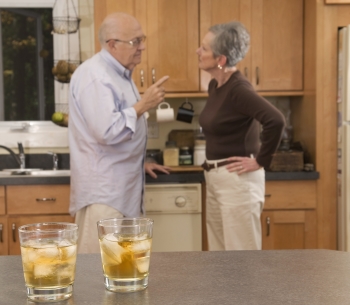Alcohol abuse is an under-reported, but entirely common, issue among seniors. Elderly and alcohol abuse can often leads to alcoholism. Approximately one of every three people who struggle with alcoholism don't develop this problem until later in life. It can be easy to miss, as well, especially for seniors who are socially isolated.
Alcohol has a different effect on aging bodies than it does for younger drinkers. Its ordinary effects-loss of inhibitions, loss of motor skills and balance, and other symptoms-can affect older people more quickly and more strongly. Get Help Today!
Alcohol can also interact with prescription drugs the older person is taking in harmful ways. Anyone can develop an alcohol problem later in life.
If you're not sure whether your elderly loved one may have a problem, here are a few signs to watch for.
The person with an alcohol problem denies there is a problem. People with alcohol dependencies often deny there is a problem for a long time.
They may justify their drinking with excuses that stand out as strange, such as "I don't have a problem with alcohol because I never drink before 5pm" or "It's not a problem because I only drink beer." Alcoholics often will distort reality or question perceptions in order to cover up for their drinking.
The person's social life has changed. Alcoholics will sometimes arrange their social lives around activities where they can get alcohol-such as going to bars or parties where drinks will be served-and will avoid social gatherings where there won't be drinking. Others mainly drink alone, and may reduce the time they spend socializing, working, or doing other outside activities because of their drinking.
The person tries to
hide their drinking. Alcoholics will sometimes hide empty
bottles around the house in order to keep their loved ones from
realizing how much they are drinking. If you open a cupboard or
drawer somewhere in the house and find a collection of empty
bottles, this could be a warning sign.
Their friendships
have changed. People who are dependent on alcohol sometimes
feel conspicuous at social gatherings where other people are
drinking socially-because their own drinking is so much heavier than
that of those around them. In some cases, the person will seek out
heavier drinkers so that his or her own drinking won't stand out.
They make excuses
to drink. If your loved one continually finds excuses to
drink-either to celebrate good news, make up for a bad day, or other
reasons-it's not necessarily a sign of alcoholism. It can be,
however, especially when taken in addition to other signs.
Their life is
falling apart. If your normally-conscientious relative is
suddenly missing appointments, it could be a sign of a lot of
things-chronic pain and depression among others. It could also be a
sign of alcoholism, especially when taken in conjunction with other
signs. Other symptoms to watch for including changed appearance,
lack of attention to hygiene, weight gain, skin problems, and other
issues.
'Alcoholism can be difficult to spot, because many people with
alcohol dependency issues go to great lengths to hide or minimize
their drinking. There are some signs to spot, however. Hopefully,
the sooner you see the signs, the sooner your loved one can get
help.
Home | About | Articles | Resources | Site Map | Privacy Policy
Elder Options of Texas
Copyright 2001-2024
All Rights Reserved
DISCLAIMER: Links to other websites or references to products, services or publications do not imply the endorsement or approval of such websites, products, services or publications by Elder Options of Texas. The determination of the need for senior care services and the choice of a facility is an extremely important decision. Please make your own independent investigation.



